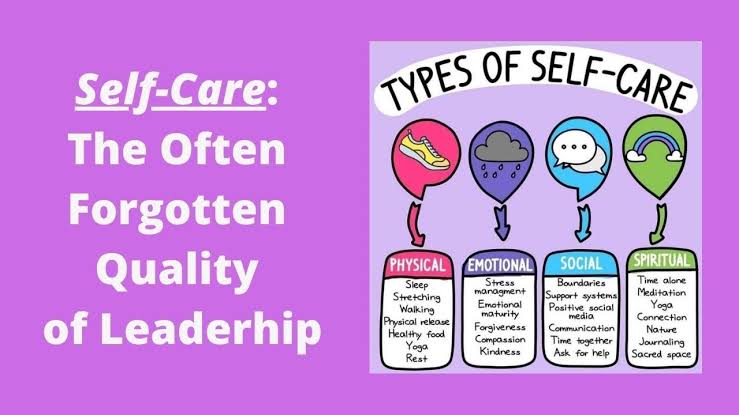Leadership is often romanticized as tireless drive, unshakable resilience, and relentless productivity. While these qualities are certainly valuable, they can also lead to exhaustion, burnout, and poor decision-making when not balanced with self-care. In today’s fast-paced work culture, leaders are expected to lead teams, make critical decisions, and adapt to constant change—all while maintaining clarity and vision.
Why Self-Care Matters for Leaders
Yet, many leaders tend to neglect their own well-being in the pursuit of high performance. The truth is, self-care is not a luxury—it’s a necessity. It enables leaders to remain mentally sharp, emotionally stable, and physically capable. Without it, the risk of fatigue and poor leadership increases, ultimately affecting team morale, productivity, and organizational outcomes.
Setting the Example for Teams
One of the most powerful reasons for leaders to prioritize self-care is that it sets a tone for the rest of the organization. Teams often mirror the habits, energy, and behaviors of their leaders. If a leader is constantly stressed, unavailable, or overwhelmed, it sends a message that burnout is part of the culture.
On the other hand, when leaders demonstrate healthy boundaries, take breaks, and speak openly about wellness, they empower others to do the same. This cultivates a workplace environment that respects rest, balance, and mental health—leading to lower turnover, greater innovation, and sustained productivity.
Leaders who care for themselves inspire trust and model what it means to show up with integrity and intention. In 2025, with greater focus on organizational mental wellness, this example is more important than ever.
Improving Decision-Making and Clarity
Good leadership relies heavily on clear thinking, emotional intelligence, and the ability to respond rather than react. These qualities require a well-regulated nervous system and a rested mind—both of which are nurtured through consistent self-care.
Sleep, nutrition, exercise, and mindfulness all contribute to cognitive sharpness. Leaders who are well-rested and nourished tend to make more rational, creative, and ethical decisions. They can also better manage conflicts, maintain perspective, and respond to challenges with calm and confidence.
Conversely, chronic stress and fatigue impair memory, focus, and judgment. In high-stakes environments, this can lead to costly mistakes and reputational damage. Self-care isn’t just about personal comfort—it’s a critical element of sound leadership performance.
Emotional Resilience and Stress Management
Leaders constantly deal with pressure, whether it’s from stakeholders, employees, or market forces. Without proper outlets for stress, this pressure can accumulate and manifest as anxiety, irritability, or burnout.
Practicing regular self-care helps leaders build emotional resilience—the ability to bounce back from setbacks and remain composed in difficult situations. This may involve:
- Engaging in regular physical activity
- Practicing mindfulness or meditation
- Scheduling therapy or coaching sessions
- Spending quality time with family or in nature
In 2025, many organizations now offer executive wellness programs that incorporate coaching, stress reduction, and personalized wellness strategies. Leaders who embrace these resources are better equipped to lead through change and uncertainty.
Time Management and Energy Preservation
Contrary to the belief that self-care takes time away from productivity, it often results in better time and energy management. Leaders who practice self-care are more likely to set boundaries, delegate effectively, and avoid overcommitment.
Here are some ways self-care improves productivity:
- Increased energy levels – A healthy body and mind reduce fatigue throughout the workday.
- Better focus – Clear mental space enhances efficiency and deep work.
- Stronger boundaries – Knowing when to say no protects energy and avoids burnout.
Self-care teaches leaders to work smarter, not harder. It helps them recognize that rest is not wasted time, but an investment in sustained effectiveness.
Enhancing Relationships and Communication
Leadership is not just about strategy and execution—it’s also about connection. Leaders who neglect self-care often become emotionally unavailable, short-tempered, or withdrawn. This can damage relationships with team members and erode trust.
Self-care fosters emotional regulation and empathy, allowing leaders to connect more authentically with others. It improves listening, reduces reactive behavior, and builds deeper understanding within teams.
By prioritizing their well-being, leaders can be more present in conversations, more patient during conflict, and more generous with recognition and feedback. These qualities are essential in building high-performing, cohesive teams.
Practical Self-Care Tips for Busy Leaders
While every leader has different needs and schedules, there are universal self-care practices that can be adapted into even the busiest routines:
- Morning routines – Start the day with meditation, journaling, or a short workout.
- Digital boundaries – Limit screen time after work hours and take tech-free breaks.
- Regular check-ins – Schedule weekly time to assess your emotional and physical health.
- Time off – Take vacations or mental health days without guilt.
- Support systems – Surround yourself with trusted peers, coaches, or mentors.
Using tools like calendars, habit trackers, and mindfulness apps can make these habits easier to maintain. The goal isn’t perfection—it’s consistency and intention.
Conclusion
In the evolving leadership landscape of 2025, self-care is no longer an optional add-on—it is a core leadership competency. It allows leaders to perform at their best while inspiring the same in their teams. From decision-making and emotional regulation to time management and communication, the ripple effects of self-care are both personal and organizational.
By valuing their own well-being, leaders model a more humane, sustainable, and successful approach to leadership. Ultimately, a leader who cares for themselves is far more capable of caring for the people and mission they serve.



